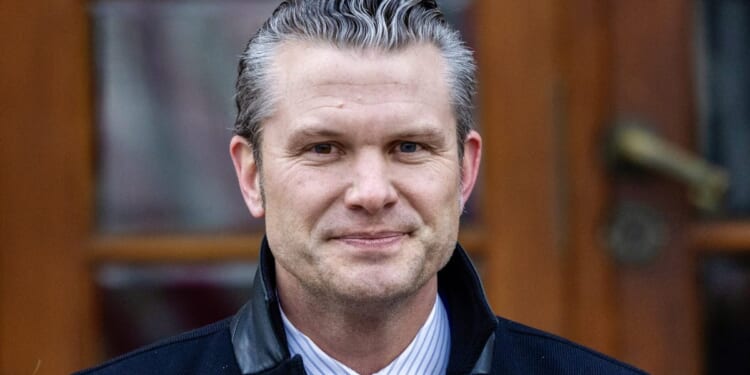Democrats and media just can’t quit the Signal story, as evidenced by the broadcasts across multiple networks on Sunday morning. On every show, time was devoted to questions about the apparently-accidental inclusion of Atlantic Editor-in-Chief Jeffrey Goldberg in a Signal chat group in which top officials discussed an imminent attack on Houthi terrorists.
For those who don’t spend their Sunday mornings glued to the television — and their Sunday afternoons attempting to dig through a week’s worth of network and cable news media spin — The Daily Wire has compiled a short summary of what you may have missed.
Despite the fact that the attack discussed in the chat went off without so much as a hitch — and American service members do not appear to have been put in any danger — from ABC News to CNN, hosts and guests discussed whether or not the information discussed in the Signal group amounted to classified information and what should ultimately happen to those who were responsible for it.
On ABC News’ “This Week,” anchor Martha Raddatz referred to the mishap as “jaw-dropping” and an “extraordinary national security breach” — and accused President Donald Trump’s administration of “downplaying, deflecting, and at times outright dismissing” the seriousness of the situation.
“The Trump administration downplaying, deflecting and at times outright dismissing an extraordinary national security breach.” @MarthaRaddatz breaks down how Trump officials are responding to the Signal group chat containing Yemen strike details: https://t.co/5uOLPfh8tt pic.twitter.com/hAlAQs6OwQ
— This Week (@ThisWeekABC) March 30, 2025
Raddatz then brought in Senator Mark Warner (D-VA) to discuss the situation, and he claimed that despite assurances from multiple Trump administration officials that nothing discussed in the chat had been classified, he knew better.
“There is no question, regardless of agency, that this was classified,” Warner insisted, arguing that American lives could have been lost had the information been leaked to the public sooner. “It insults the intelligence of the American people when someone says, ‘Oh, no, nothing classified here.’”
Warner noted that the intelligence community had previously warned that Signal should not be used for classified information — and continued to insist that the information discussed by the Trump administration officials was classified, but never gave any specifics regarding what exactly had been divulged that was classified.
“There is no question, regardless of agency, that this was classified.”
Sen. Mark Warner said that if information had been leaked from top Trump officials’ Signal chat discussing plans to bomb the Houthis in Yemen, American lives could have been lost. https://t.co/K6lUzM1jTE pic.twitter.com/mIZpNE1Fla
— This Week (@ThisWeekABC) March 30, 2025
Raddatz followed by bringing in Rep. Mike Turner — who previously chaired the House Intelligence Committee — and he also suggested that the material discussed was classified by virtue of the fact that military plans were included. He did not mention, as Defense Secretary Pete Hegseth did shortly after the story broke, the fact that the military plans did not include coordinates either for the troops involved or the targets, nor did they give the names and locations of the units tasked with carrying out the attacks.
Still, Turner argued that it “should be considered classified information and it’s surprising to find it in an unclassified manner.”
GOP Rep. Mike Turner, former chair of the House Intelligence Committee, said “clearly” subject of military details discussed in the Signal group chat “should be considered classified information and it’s surprising to find it in an unclassified manner.” https://t.co/oPQ2UURqhG pic.twitter.com/73aXHApjw1
— This Week (@ThisWeekABC) March 30, 2025
On CBS News’ “Face the Nation,” Sue Gordon — former principal deputy director of national intelligence — weighed in on the incident, and she complained that too much focus was being given to the fact that no tragedy had resulted from the breach.
“I don’t think we should rest on the fact that nothing bad happened this time. We don’t know whether that communications path has been penetrated, so we don’t know whether state actors that have lots of resources are just sitting and lurking,” she said.
There was “nothing” about the military information discussed in the Trump administration’s Signal group chat that was “appropriate” for being shared on that app, says Sue Gordon, former principal deputy director of national intelligence.
“I don’t think we should rest on the fact… pic.twitter.com/xeoQl76Lcr
— Face The Nation (@FaceTheNation) March 30, 2025
Former CENTCOM commander, Retired Gen. Frank McKenzie, pushed back a bit and noted that there was one major component of the story that was getting lost underneath all the noise regarding the Signal chat group — the fact that the Trump administration was successfully taking the fight to the Houthi terrorists in a way that President Joe Biden’s administration either could not or would not do.
“I think we have the capability — actually, right now, in Iran’s weakened state — to threaten them very strongly,” McKenzie said, adding that he “wouldn’t take anything off the table” with regard to next steps against the Houthis and Iran. The United States, he explained, has “finally begun to strike the Houthis hard,” in a way “that, frankly, eluded the previous administration.”
Ret. Gen. Frank McKenzie, former CENTCOM commander, says the “larger story” behind the Signal group chat controversy is that the U.S. has “finally begun to strike the Houthis hard,” at a pace “that, frankly, eluded the previous administration.”
He adds that he “wouldn’t take… pic.twitter.com/8w9wE150z7
— Face The Nation (@FaceTheNation) March 30, 2025
On NBC’s “Meet the Press,” Jeffrey Goldberg claimed that Vice President JD Vance’s comments in the chat were proof that he didn’t think President Trump fully grasped the situation.
What Vance actually said in the chat was that he favored delaying the strikes for a month because an immediate strike — besides sending an obvious message to the Houthis — ultimately did more to benefit and bail out Europe than it did for the United States.
“I am not sure the president is aware how inconsistent this is with his message on Europe right now,” he said, referencing the administration’s broader position that Europe needed to step up and take an active role in its own defense.
Vance Signal messages suggest he doesn’t think Trump knows what he’s doing, Goldberg says https://t.co/9P79IZMqjA
— Meet the Press (@MeetThePress) March 30, 2025
And on CNN’s “State of the Union,” Dana Bash brought in Senator James Lankford (R-OK) — who agreed that an investigation into the Signal chat was “entirely appropriate.”
.@SenatorLankford tells @DanaBashCNN that it’s “entirely appropriate” for the acting Pentagon inspector general to look into top Trump officials discussing military plans on Signal. pic.twitter.com/2mYxfcIOfy
— State of the Union (@CNNSOTU) March 30, 2025
Later on in the broadcast, however, Republican commentator Scott Jennings dismantled the argument that Trump administration heads — particularly Defense Secretary Pete Hegseth’s and National Security Adviser Mike Waltz’s — should roll over the breach, pointing out that the bar for such firings had been set by the Biden administration.
Scott Jennings lays out the plain facts to Dems calling for firings over Signalgate —
JENNINGS: “The bar for firing people like this is really high from the last administration when after the Afghanistan withdrawal, which was a disaster, people died.”
“No accountability was… pic.twitter.com/eE5n3liLIk
— Western Lensman (@WesternLensman) March 30, 2025
“If you’re trying to assess ‘what should we do about it,’ I hear Democrats arguing, ‘Well, we should fire Pete Hegseth,’ or, ‘We should fire the National Security Adviser,’” Jennings said. “The bar for firing people like this is really high from the last administration when after the Afghanistan withdrawal, which was a disaster, people died, no accountability was meted out. After the drone strike that vaporized those poor kids and that family, no accountability. After the secretary of defense went AWOL, no accountability.”











